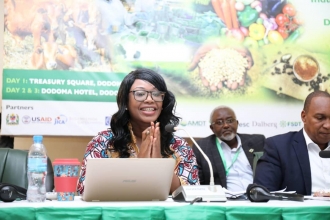
EfD Impact Stories 2019
EfD aims to support a new generation of engaged researchers based in the Global South. In this magazine you will find stories of the work carried out at our EfD centers across the world. First: In…

EfD aims to support a new generation of engaged researchers based in the Global South. In this magazine you will find stories of the work carried out at our EfD centers across the world. First: In…
The Tanzanian component of the VALOR Project (2014-2018) studied quality factors, traits and conditions with potential to increase value of agricultural products in Tanzania through Geographical Indication (GI) protection, by recognizing territory specific (origin) products stewarded by smallholder. This policy brief summarises the key findings on policy option flowing from the research.
Parks and nature reserves created for conservation often become forest islands in a matrix of other land uses. Their species populations often decline due to this forest fragmentation. There is increasing evidence that conservation outside of reserves is required to slow biodiversity loss. This evidence, coupled with the species decline due to fragmentation, implies that conservation policies require a landscape perspective that includes the land in between protected areas. In low-income countries, however, these “matrix” areas often support rural people’s livelihoods.
The Global Green Growth Institute ( GGGI ) and the Green Growth Knowledge Platform ( GGKP ) have issued a Call for Papers for the Seventh GGKP Annual Conference ( #GGKP7 ). The conference will focus…
We analyze the impact of a new storage technology and training on post-harvest losses among small-scale maize farmers in rural Tanzania. The analysis is based on data collected by means of a randomized controlled trial (RCT) in which farmers were randomized into one of three groups: a control group and two treatment groups. Farmers in the first treatment group received training on post-harvest management practices, and farmers in the second treatment group were provided with hermetic (airtight) bags for storing maize, as well as the training administered to the first treatment group.
Smallholder farms in Tanzania rely on wild pollinators, but there are drastic changes in land use which result in the reduction of wild pollinators’ natural habitat, that is, forests. Our interest is to show how this affects crop revenue of smallholder farm households

On May 6 th, 2019 the World Bank together with the Vice President’s office launched the Tanzania Country Environmental Analysis at the Hyatt hotel in Dar es Salaam Tanzania. The launch was attended by…
This paper focuses on improved storage and preservation technologies as an adaptation strategy in response to climate change.
Despite the importance of naturally available wild pollination ecosystem services in enhancing sub-Saharan African smallholder farms’ productivity, their values to actual farming systems remain unknown. We develop a nationally representative empirical assessment by integrating nationally representative plot level panel data with spatially and temporally matched land cover maps to identify the contribution of wild pollinators to crop revenue.

T he President of the United Republic of Tanzania, His Excellence Dr . John Pombe Magufuli launched the second phase of the Agricultural Sector Development Program (ASDP2) in 2018. This program was at…